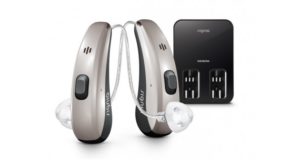Rechargeable Hearing Aid Batteries
Smart Hearing Aid Technology and Energy Sources
 Hearing aids have revolutionized the way we hear the world around us. In the past decade, they have evolved into discreet, fast, and incredibly powerful devices – not unlike tiny computers we can wear in our ears! But unlike our laptops and smartphones which are fully rechargeable, hearing aids use very small batteries that aren’t rechargeable. Until now. We’ve finally found a way to fulfill advanced power needs in a tiny rechargeable battery!
Hearing aids have revolutionized the way we hear the world around us. In the past decade, they have evolved into discreet, fast, and incredibly powerful devices – not unlike tiny computers we can wear in our ears! But unlike our laptops and smartphones which are fully rechargeable, hearing aids use very small batteries that aren’t rechargeable. Until now. We’ve finally found a way to fulfill advanced power needs in a tiny rechargeable battery!
The Problem with Hearing Aid Batteries
Prior to new wireless features, zinc air hearing aid batteries could last anywhere between one to two weeks, which meant binaural hearing aid wearers used, on average, 100 zinc air batteries a year. Now, with the higher energy usage of wireless technology, zinc air batters last no longer than one to two days, on average. It is estimated that 150 billion zinc air hearing aid batteries are disposed of annually. This comes as a cost to both the hearing aid wearer and the environment.
Some hearing aid wearers may find they are spending up to $150 a year on hearing aid batteries alone. At the same time, with so many new advanced features, wearers may find there is less confidence in the lasting power of batteries. Instead of feeling confident that your hearing aids will work for you anywhere you go, you must remember to bring an extra set of batteries with you, just in case. If you lead an active lifestyle, or find yourself often in louder settings, the hearing aid processes more auditory information and drains more battery than normal, leaving you vulnerable if you do not have an extra set.
Consider the math: if you wear two hearing aids, you are replacing two batteries every few days or once a week. Even with rechargeable batteries, they still need to be replaced once a year. Annually, 150 billion zinc air batteries make their way to landfills. As they are not recyclable, these batteries become waste product which run the risk of seeping lead and acid into underground water supplies and become an environmental hazard.
Rechargeable Hearing Solutions
This brings greater benefits to hearing aid wearers as well. As hearing loss is a common condition in older Americans, who may also experience difficulty with dexterity and arthritis, rechargeable hearing aids offer ease of use. Rather than struggling with the small components of the hearing aid to replace the tiny batteries, wearers simply remove their hearing aids, place them in the recharging station at night, and wake up to fully charged batteries in the morning.
Additionally, rechargeable hearing aids reduce the level of lead and acid that seeps into our water supply from disposed batteries. They are also more cost-effective. And, since rechargeable hearing aids are designed to keep their charge for a specific amount of time, hearing aid wearers may go through their days with confidence, knowing they will not drain their batteries.
